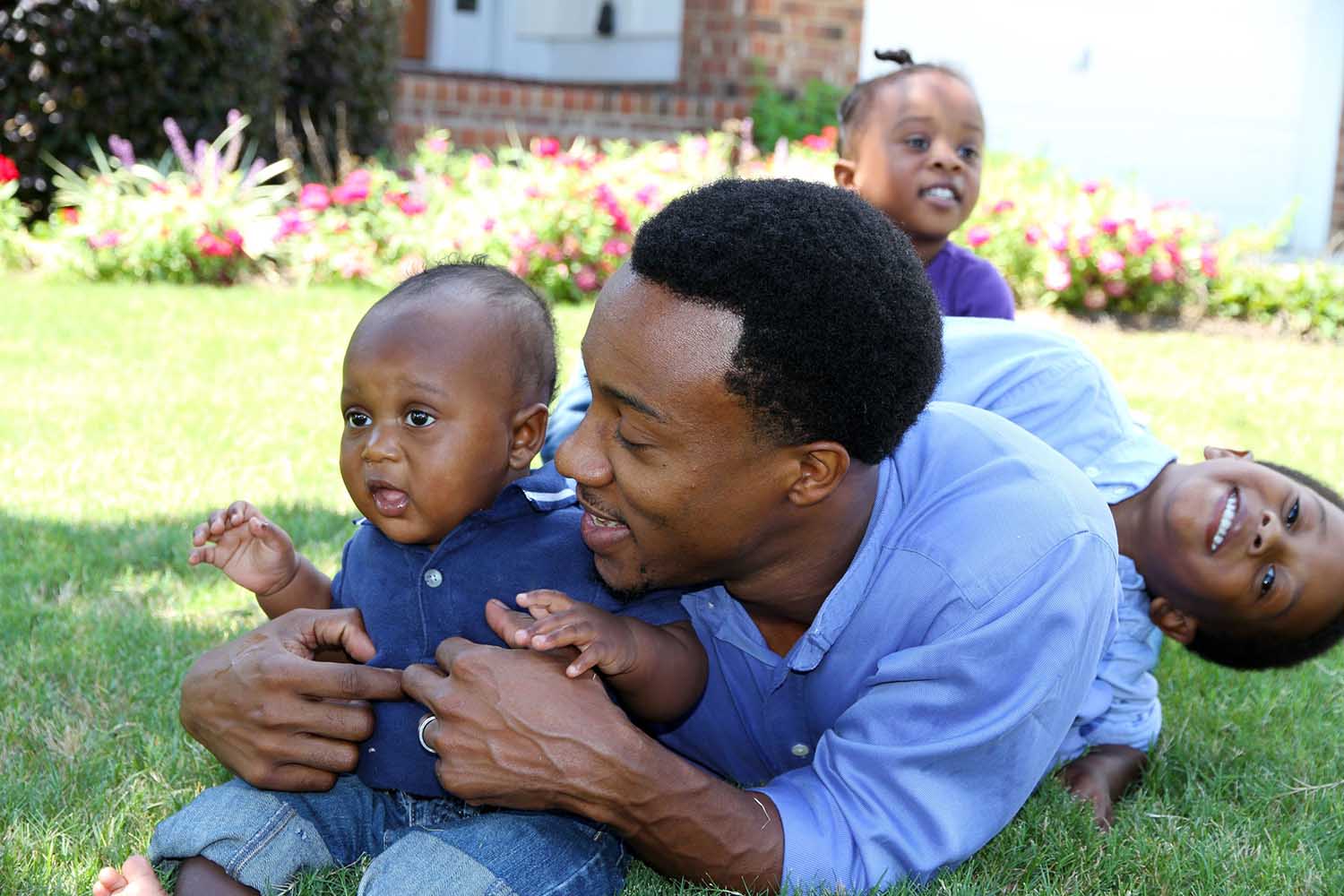The Supporting Father Involvement program (SFI)
About SFI
The default family paradigm that still prevails in most social service settings typically focuses on the family as “a mother and her children.” This emphasis tends to relegate fathers to a diminished role, marginalizing their potential and their importance. We invite you to learn about The Supporting Father Involvement Program (SFI), a clinical and research intervention by the team of Drs. Philip A. Cowan, Carolyn Pape Cowan, Marsha Kline Pruett, and Kyle D. Pruett, MD. A statewide dissemination effort of SFI in California was conducted and international replications are underway in Alberta, Canada and London and other cities of the U.K.
The first five years are a particularly critical time to develop healthy patterns and family interactions, but, historically, family resource centers and programs have leaned away from pro-actively involving fathers. From home visits to parenting classes, the majority of programs cater primarily to mothers, due to the mistaken belief that mothers are the sole pathway to children’s development and well-being.
SFI research on why fathers matter
This research and intervention represents the first randomized, controlled clinical trial focused on father involvement in low-and middle-income families. The study, which has enrolled over 800 families – compared father-only and father-mother interventions with each other and against a control group, and evaluated the impacts on the parents, families, and children. Five family life domains are addressed in the curriculum and in the assessment of outcome: the well-being of the individual parents, the quality of the relationship between the parents and in the family of origin relationships, parenting styles, and outside stresses and social supports (e.g., employment).
Video (Eng) | SFI Research Outcomes (20:25)
The research confirms that when fathers become more involved in parenting – and in working with mothers as co-parents and partners – healthier parents, children, and families are the outcome. Parents participating in groups experience reduced stress and anxiety, are more satisfied with their relationship, and employ less harsh discipline. Couples groups are more effective than groups made up only of fathers. While children of parents in the control group get more anxious and aggressive over time, children of parents in fathers groups and couples groups do not increase their problem behavior over the same period. Moreover, SFI results reveal that agencies that serve families can become more father friendly, thus creating organizational/institutional/community change as well as family change.
SFI curriculum
The Supporting Father Involvement program entails a) a 32-hour SFI curriculum, typically led over 16 weeks (either for fathers only or for couples) by two experienced clinicians, b) case management, and c) organizational change efforts designed for agencies serving primarily low-income families. Program staff at each site include a project director, group leaders, and case managers.
An important element of the SFI program curriculum is that group leaders do not prescribe specific behaviors for men and women as partners or as parents. Instead, they offer a group environment in which partners can explore their own ideas, goals, and ways of relating to each other based on their own culture and values. The program has now been used successfully with families from a range of economic circumstances and ethnic backgrounds – in the U.S., Canada, and the U.K.
Reprinted with permission from Supportive Father Involvement (SSI).
Contributor: Kyle D. Pruett, M.D., serves a Expert Consultant to the ECPC. He is a Clinical Professor of Child Psychiatry at the Yale School of Medicine, and a founding member of the Early Childhood Peace Consortium (ECPC). He is a prominent author, international lecturer, media personality and pioneering researcher, conducting the country’s only long-term study of the impact on children of primary caretaking fathers.
SFI & relevant information
- Case, Cowan, Cowan, Draper, Amba, Hewison. (2017). Parents as Partners: A U.K. Trial. Family Process
- Cowan, Cowan, Cohen, Pruett, & Pruett. (2008). Supporting Fathers’ Engagement with Their Kids
- Cowan, Cowan, Pruett, Pruett. (2007). Preventing Coparenting Conflict and Divorce. Family Process
- Cowan, Cowan, Pruett, & Pruett. (2009). Six Barriers to Father Involvement and Suggestions for Overcoming Them. National Council of Family Relations Report.
- Cowan, Cowan, Pruett, Pruett, & Gillette. (2014). Evaluating a Couples Group to Enhance Father Involvement in Low-Income Families Using a Benchmark Comparison. Family Relations.
- Cowan, Cowan, Pruett, Pruett, & Wong. (2009). Promoting Fathers’ Engagement with Children
- Knox, Cowan, & Cowan. (2011). Policies That Strengthen Fatherhood and Family Relationships. Annals of the American Academy of Political and Social Science.
- Pruett, Cowan, Cowan, Pruett. (2009). Lessons Learned Cross-Cultural Preventive Intervention
- Pruett, Gillette, & Pruett. (2017). Supporting Father Involvement to Promote Co-Parent, Parent and Child Outcomes in a Canadian Context. Psychology & Psychological Research International Journal
- Pruett, Pruett, Cowan, & Cowan. (2009). Fathers As Resources In Families Involved In The Child Welfare System Protecting Children
- Pruett, Pruett, Cowan, & Cowan. (2012). Supporting Father Involvement In The Context of Separation and Divorce
- Pruett, Pruett, Cowan, & Cowan. (2017). Enhancing Father Involvement In Low-Income Families. Child Development
- Pruett, Pruett, Cowan, & Cowan. (2017). Enhancing Paternal Engagement in a Coparenting Paradigm. Child Development Perspectives
New fathers in Rwanda use 40% less violence against a partner nearly 2 years after MenCare program, reveals new study. Results from a randomized controlled trial (RCT) released April, 2018 in the journal PLOS ONE reveal powerful impacts of targeted, gender-transformative programming on health and violence in Rwanda.
“Evidence clearly points to the unique and significant role of the father right from the early stages of infancy” and “suggests that the involvement of both parents in intervention is likely, in most cases, to lead to more positive benefits for children.” - P. Ramchandi & J. Iles. From Commentary: Getting fathers into parenting programmes – a reflection on Panter-Brick et al. (2014).
JOIN THE CONVERSATION
For breaking news and to stay connected, follow us on social media. Sign up to get our E-News delivered straight to your inbox.




